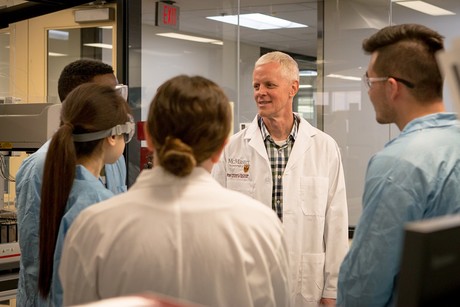Canadian researchers find combo therapy stops superbugs

Researchers from the McMaster University, Canada, have found a new way to treat the superbugs that are resistant to all known antibiotics. The research, led by Eric Brown, professor of biochemistry and biomedical science at McMaster’s Michael G. DeGroote School of Medicine, has been published in the journal Nature Microbiolog.
The discovery of an effective combination therapy has the potential to change medical practice for the treatment of the drug-resistant infections which the World Health Organization (WHO) identified as of “critical priority” for their threat to human health.
“We looked for compounds that would mess with these bacteria, and I think we’re nailing it,” said Professor Brown.
His team focused on Gram-negative bacteria which are resistant to all antibiotics including last resort drugs, such as colistin, and lead to pneumonia, wound or surgical site and bloodstream infections, as well as meningitis in healthcare settings.
Gram-negative bacteria have an intrinsically impenetrable outer shell that is a barrier to many otherwise effective antibiotics, and this makes these infections deadly, particularly in hospital settings. Professor Brown tested a collection of 1440 off-patent drugs in search of one that might compromise that barrier in the superbugs.
“These pathogens are really hard nuts to crack, but we found a molecule that shreds that shell and allows antibiotics to enter and be effective,” said Brown.
The antiprotozoal drug pentamidine was discovered to disrupt the cell surface of Gram-negative bacteria, even the most resistant. The anti-fungal medication was particularly potent when used with antibiotics against multidrug-resistant bacteria.
Pentamidine, when used with other antibiotics, was found to be particularly effective against two of the three pathogens which the WHO has identified as having the most critical priority for development of new antibiotics. Those were Acinetobacter baumannii and the Enterobacteriaceae. The combo therapy also had some impact on the third most critical bacteria, Pseudomonas aeruginosa.
The discovery was found to be effective in the lab and in mice, but more work is needed to offset potential side effects and ensure human safety. Brown added that his lab is continuing to test more compounds as well.
“One of the things we want to pursue further is why this is working so well.”
How do different types of pain influence empathy?
Different types of pain influence how unpleasantly we perceive it but also how we empathise with...
Hospital waiting times remain high, new Productivity Commission data reveals
As part of the Report on Government Services, the Productivity Commission has published its...
REDFEB highlights the impacts of chronic stress on the heart
February is Heart Research Australia's heart disease awareness month, REDFEB, and the effects...



![[New Zealand] Transform from Security Awareness to a Security Culture: A Vital Shift for SMB Healthcare — Webinar](https://d1v1e13ebw3o15.cloudfront.net/data/89856/wfmedia_thumb/..jpg)
![[Australia] Transform from Security Awareness to a Security Culture: A Vital Shift for SMB Healthcare — Webinar](https://d1v1e13ebw3o15.cloudfront.net/data/89855/wfmedia_thumb/..jpg)




